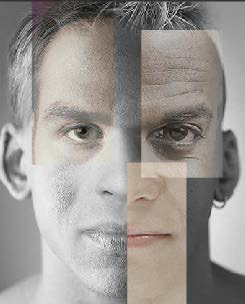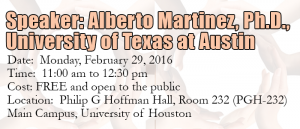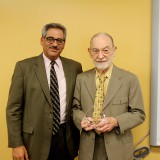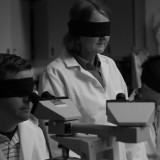Ethics in Science Lecture Series | Classifying People by Color: How Racial Categories Change Over Time
 Although skin tones are not the most scientific way to classify people, such classifications are among the most pervasive ways in which people think about others. Even scientists, physicians, and statisticians end up using such traditional and problematic categories. Martinez argues that we should stop utilizing traditional racial categories, demonstrating how they have changed over time, to illustrate their arbitrariness. He maintains that it is unethical for scientists to reify traditional racial classifications and that we should devise better ways to plainly describe human differences.
Although skin tones are not the most scientific way to classify people, such classifications are among the most pervasive ways in which people think about others. Even scientists, physicians, and statisticians end up using such traditional and problematic categories. Martinez argues that we should stop utilizing traditional racial categories, demonstrating how they have changed over time, to illustrate their arbitrariness. He maintains that it is unethical for scientists to reify traditional racial classifications and that we should devise better ways to plainly describe human differences.
Abstract: For years, Alberto Martinez taught a course titled “Biology, Behavior, and Injustice.” Among various topics, they discuss the history of how past scientists struggled to classify people in terms of race. At the University of Texas at Austin, where he teaches, students are classified into five major racial categories: Black, Hispanic, Native American, Asian, and White. For comparison, he shows his students an old science textbook, published a hundred years ago, that shows somewhat similar racial categories: “Black,” “Brown,” “Red,” “Yellow,” and “White.” Now of course, skin tones are not the most scientific way to classify people. Still, such classifications are among the most pervasive ways in which people think about others. Even scientists, physicians, and statisticians end up using and reifying such traditional and problematic categories. He will argue that we should stop reifying traditional racial categories. To do so, he will show how racial categories have changed over time, in American history in particular, to illustrate the arbitrariness of such categories. There will also be discussions regarding the results of an experiment that he has carried out with students at UT Austin. He compared students’ perceptions of skin tones and have found strikingly unexpected results showing how much they disagree when trying to identify races. He will urge that it is unethical for scientists to reify traditional racial classifications, but that we should devise better ways to plainly describe human differences.
About Professor Martinez: Alberto Martinez is a professor of history of science at the University of Texas at Austin. He was born and raised in San Juan, Puerto Rico. He earned an M.A. at New York University, followed by a Ph.D. in History of Science and Technology at the University of Minnesota. Subsequently, he carried out fellowships at The Smithsonian, the Dibner Institute at M.I.T., and the C enter for Einstein Studies at Boston University. He was also the Weisman Instructor in History of Science, at Caltech. He is now the Director of the Certificate Program in History and Philosophy of Science at UT Austin. Martinez’s most recent book is The Cult of Pythagoras: Math and Myths (University of Pittsburgh Press, 2012), on the evolution of myths in the history of mathematics. He is also the author of Science Secrets: The Truth About Darwin’s Finches, Einstein’s Wife, and Other Myths (University of Pittsburgh Press, 2011). And previously, he published Kinematics: The Lost Origins of Einstein’s Relativity (Johns Hopkins, 2009), and Negative Math: How Mathematical Rules Can Be Positively Bent (Princeton University Press, 2005). He has also published articles in several journals and periodicals including American Journal of Physics, Archive for History of Exact Sciences, Physics in Perspective, American Mathematical Monthly, and School Science Review.
enter for Einstein Studies at Boston University. He was also the Weisman Instructor in History of Science, at Caltech. He is now the Director of the Certificate Program in History and Philosophy of Science at UT Austin. Martinez’s most recent book is The Cult of Pythagoras: Math and Myths (University of Pittsburgh Press, 2012), on the evolution of myths in the history of mathematics. He is also the author of Science Secrets: The Truth About Darwin’s Finches, Einstein’s Wife, and Other Myths (University of Pittsburgh Press, 2011). And previously, he published Kinematics: The Lost Origins of Einstein’s Relativity (Johns Hopkins, 2009), and Negative Math: How Mathematical Rules Can Be Positively Bent (Princeton University Press, 2005). He has also published articles in several journals and periodicals including American Journal of Physics, Archive for History of Exact Sciences, Physics in Perspective, American Mathematical Monthly, and School Science Review.
For more information, please visit the Ethics in Science website at http://www.uh.edu/ethicsinscience/Seminars/Alberto-Martinez.php















